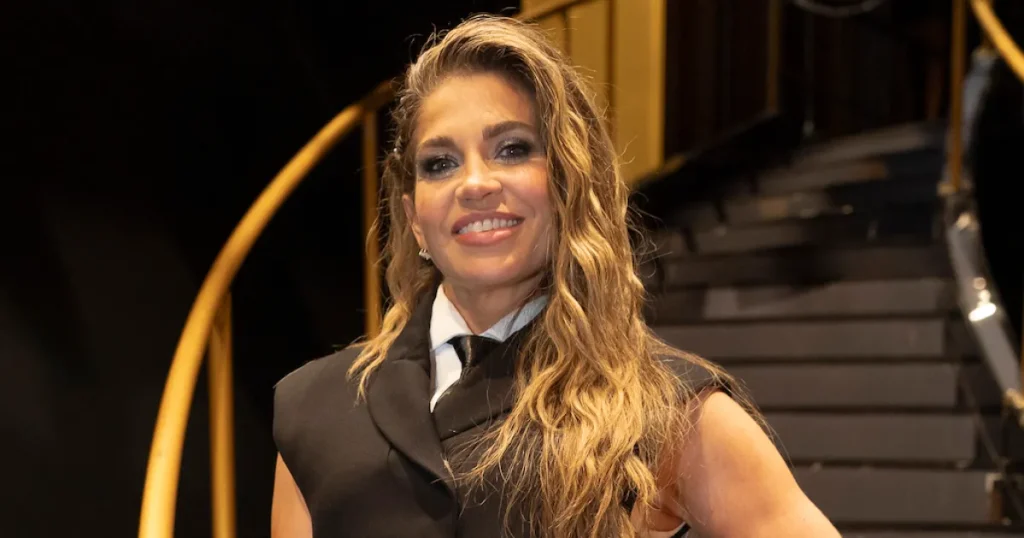Danielle Fishel’s Dancing With The Stars Journey: When Personal Stories Go Unheard
In a heartfelt Instagram post on November 7, Danielle Fishel shared her disappointment about a crucial element missing from her final appearance on Dancing With The Stars. The 44-year-old actress revealed that the show edited out the deeply personal story behind the choreography she and her dance partner Pasha Pashkov had created. When given the opportunity to dance to Aerosmith’s “Dream On,” Fishel crafted a narrative about the impossible standards women face in society. “If we pursue work outside the home and have a family, we’re told that we should be with our kids more. If we stay home, we’re told we don’t work and are uninteresting,” she explained. This dichotomy extends to physical appearance as well, where women are criticized for being too thin or gaining weight, judged for cosmetic procedures or looking “old and ugly” when aging naturally. What made this narrative particularly meaningful was how Fishel’s recent breast cancer diagnosis in 2024 had transformed her perspective on these societal pressures.
The Boy Meets World alum had intended her dance to reflect a profound life philosophy that emerged from her cancer journey: “We are sometimes always too much and never enough at the same time and the only cure for it is to live life your way, living out your dreams because as my cancer diagnosis pointed out to me last year, life is short and we never know when we’re living our last day or dancing our last dance.” These words weren’t just casual thoughts but the emotional foundation upon which Pashkov had built their entire routine. The choreography was specifically designed with Pashkov representing “the noise, the judgements, the criticism, and expectations” while Fishel’s character evolved throughout the dance, learning to “stop fighting it and instead learn to live with it and rise above it.” This artistic choice carried a powerful message about resilience in the face of life’s inevitable challenges.
The moment of realization came when Fishel was standing on the ballroom floor, waiting for her introduction package to play. As she listened, the disconnect became painfully apparent: “None of that was even mentioned, like none of my story was even in the package,” she recounted with evident disappointment. This wasn’t merely about screen time or attention; it represented something far more significant to Fishel. The dance wasn’t just movements set to music but a physical embodiment of her life philosophy and cancer journey. By omitting this context, viewers were left to interpret a routine stripped of its emotional core and transformative message. Though she acknowledged such editorial decisions are “completely out of our control,” the impact clearly resonated with her deeply enough to address it publicly after her elimination.
In the comments section of her Instagram post, Fishel elaborated on why this omission bothered her so profoundly. The choreographic choices weren’t arbitrary but deliberately constructed to tell her story of personal growth. Without the explanation of what Pashkov’s character represented and how Fishel’s response to him evolved throughout the performance, audiences missed the dance’s true meaning. The routine was designed to illustrate a universal truth: while we cannot stop external judgments and expectations, we can transform how we respond to them. This message—particularly powerful coming from someone facing a cancer diagnosis—could have resonated with countless viewers navigating their own struggles with societal pressures and life-altering challenges.
Despite this disappointment, Fishel and Pashkov delivered a performance that earned them a respectable 34 out of 40 from judges Carrie Ann Inaba, Bruno Tonioli, Derek Hough, and guest judge Flavor Flav. However, it wasn’t enough to keep them in the competition, and they were eliminated on November 4. The score, while solid, doesn’t reflect what might have been had viewers understood the emotional depth and personal significance behind their routine. Dance as an art form has always been about storytelling through movement, and in competitive settings like Dancing With The Stars, the narrative context often provides crucial emotional connection between performers and audience. For Fishel, whose dance represented not just technique but her journey through cancer and society’s contradictory expectations of women, having that context removed fundamentally altered how her performance could be received.
Following her elimination, Fishel shared a clip from her “Danielle With Stars” podcast on Instagram, reflecting on her journey with remarkable grace despite her disappointment about the edited package. “Tonight was my last night, it was my last dance. I was eliminated and I have such a wide range of emotions,” she admitted, acknowledging the significant life adjustment ahead as her intensive dance training schedule ends. Rather than dwelling solely on what went wrong, she expressed profound gratitude for the experience: “It couldn’t have gone any better. I am so lucky. I was so lucky that Pasha was my partner.” This balanced perspective—acknowledging disappointment while celebrating the journey—demonstrates the very resilience her dance was meant to portray. Though viewers didn’t get to hear the story behind her performance, Fishel continues to embody its message: learning to rise above criticism and external expectations to embrace life on her own terms, especially in the wake of her cancer diagnosis that reminded her how precious each moment truly is.


